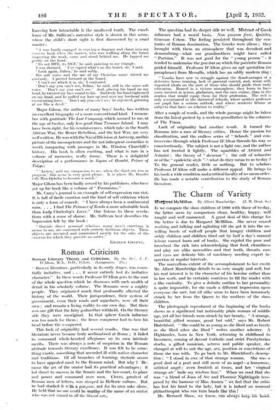Roman Criticism
Roman Literary Theory and Criticism. By the Bev. J. F. D'Altom M.A., D.D., D.Litt. (Longmans. 21s.) " 1O.5IALA literature, particularly in its early stages, was essen- tially imitative, and . . . it never entirely lost its imitative character." In these words professor D'Alton goes to the root of the whole quc4ion which he discusses with such wealth of detail in his scholarly volume. The Romans were a mighty people. They originated nmeli that profoundly affected the history of the world. Their jurisprudence, their system of government, even their roads and aqueducts, were all their own ; and remain a living reality to our own day. But there was one gift that the fairy godmother withheld. On the literary side they: were unoriginal. In that sphere Greek influence. was too much for them ; the fierce conqueror had to bow his head before the conquered.
This lack of originality had several results, One was that literature never became truly acclimatised at Rome ; it failed to command whole-hearted allegiance on its own intrinsic merits. .There was always a note of suspicion in the Roman attitude towards literary excellence. It was felt to be some- thing exotic, something that accorded ill with naive character' and traditions. Of all brandies of learning, rhetoric seems to have appealed most to the Roman mind. But why ? Be- cause the art of the orator had its practical advantages ; it ; led direct to success in the Senate and the law-court, to place and power and command over men. Cicero, greatest of Roman men of letters, was steeped in Hellenic culture.hal he had studied it wrth a purpose, not for its -own sake tifone.. Ite licidthat no one could be worthy of Use name of On inatOr. who was not versed in all the Ifix,ral arts, The question had its deeper side as well. Mistrust of Greek influence had a moral basis. Non-Possym ferre, 411iiites, Graceaut Uritem. The feeling persisted throughout the cen- turies of 'Ionian domination. The Greeks were aliens ; they brought with them an atmosphere that was decadent and demoralizing—what our .grandMothers might have called " Parisian." It was not good for the " young person " : it tended to undermine the graritas on which the patriotic Roman prided himself. Professor D'Alton gives an apt quotation (or paraphrase) from Messalla, which has an oddly modern ring : "Youths have, now to struggle against the disadvantages. of a defective home training, lack of parental control, and; worse still, impaired ideals on the part of those who should guide their early eduCation. Reared in a vicious atmosphere; they learn to have more interest in actors, gladiators, and-the race.course,.than Mtho studios that would equip them for their profession. The evil is only accentuated in the rhetorical achobls, whore neither professor 310V pupil has a serious outlook, and where students labour at subjects that have no relation-to reality."..
Alter a couple of words, and the whole passage might be taken from the latest protest by a modern grandfather in the columns of The Times.
Lack of originality had another result. It turned the Romans into a race of literary critics. Hence the passion for classification, and the endless series of " Schools" and con- troversies through which Professor D'Alton threads his way so conscientiously. The subject is not a light one, and the author has not treated it lightly. The squabbles of Atticist and Asianist ; the theory' of " decorum " ; the cult of urbanitas or of the " epideictic style "--l-what do they mean to us to-day, To the general reader, little or nothing. But to scholars Pridessor D'Altim will make a different appeal. He brings to his book a wide erudition and a critical faculty of no mean order. He has made a notable contribution to the study of Roman literature.
































 Previous page
Previous page